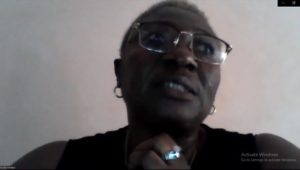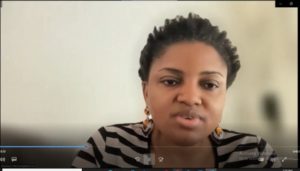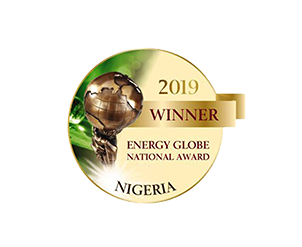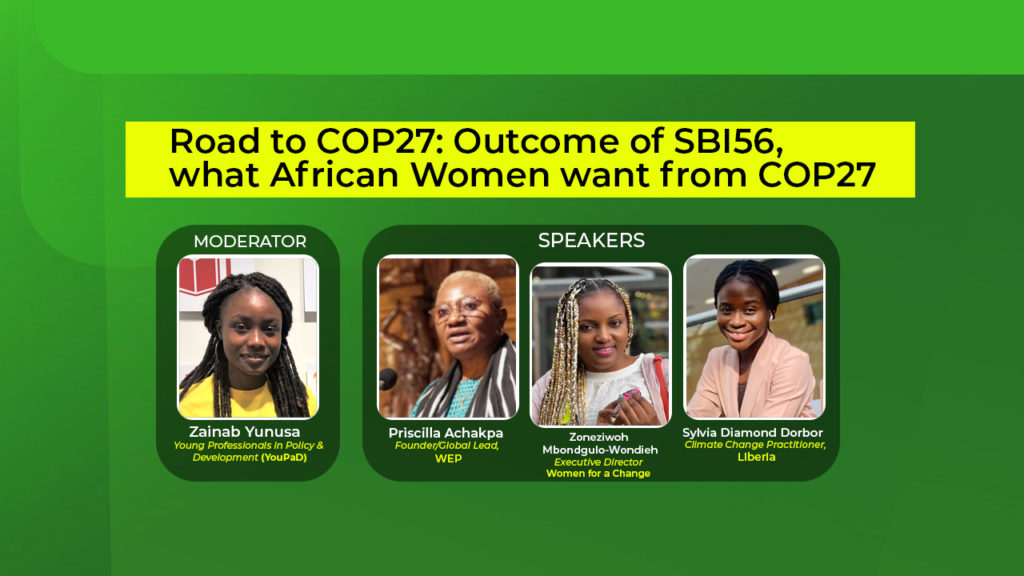
Examining the gender outcomes of SBI56
On the 30th day of June 2022, WEP organized a webinar with the theme: Road to COP27 – Outcome of SBI56 and what African women want from COP27.
The aim of the webinar was to examine the outcome of the 56th Session of the Subsidiary Body for Implementation (SBI) of the United Nations Framework Convention on Climate Change (UNFCCC), that held in Bonn, Germany from 6-16 June 2022. The webinar examined how the outcome of SBI56 will affect negotiations and the outcome of the 27th Session of the Conference of Parties to the United Nations Framework Convention on Climate Change (COP27) that is scheduled to take place in Egypt later this year.
The webinar moderated by Zainab Yunusa of Plan International Nigeria, had as its speakers, Dr Priscilla Achakpa, Founder and Global Lead of Women Environmental Programme; and Zoneziwoh Mbondgulo-Wondieh, Executive Director of Women for a Change, Cameroon.
The two speakers examined some of the outcomes of SBI56 that affect women and other vulnerable populations. They examined two agenda items that were discussed at SBI56: Gender and Climate Change; and Loss and Damage.
On the outcome of the negotiation on Gender and Climate Change, Dr Priscilla Achakpa observed that
“For me, it was disappointing that we were not able to get a position to be able to take to Egypt as a negotiating text, because the essence of the SBI56 was to develop technical text that when it gets to Egypt it will be finalized and approved. Unfortunately, we were unable to get a position at Bonn, because we had two positions we are taking to Egypt, which is as good as not taking anything. And in Egypt we have only two days to deliberate on this, so how can we arrive at a conclusion. This is very worrisome for us.” On what stalled efforts to produce a common position at SBI56, Dr Priscilla noted that one of it was climate finance. “For us in Africa, the issues of climate financing is important to us as we cannot have a Gender Action Plan which a lot of things are embedded in it and we don’t have the finance to implement them.” One of the things that the Gender Action Plan advocated for was the establishment of the National Focal Points which most of the countries that are parties to UNFCCC have already established. But it is not enough to have the National Focal Points but to empower them to carry out assignments given to them. How can they network with the grassroots, government agencies and other sectors of the society? How will they do all these without finance?”
According to Zoneziwoh
“my personal impression about the gender informal meeting was a bit sad as most of the gender focal persons especially from the sub-region where I come from were not present. And this does not align with one of the focal areas of the Gender Action Plan which talks about participation, leadership and knowledge sharing. And one of the challenges that affected their participation as we learnt was finance. There is a need for investments in women’s participation in climate change meetings, capacity building and monitoring on how far countries have been able to implement the Gender Action Plan. It is unsatisfactory that not many countries in Africa have adopted the Gender Action Plan even though they agreed to it several years ago. In as much as this is a setback, it is an opportunity for activists to really pick on this and have conversations with their different ministries for domestication of the Gender Action Plan.”
On loss and damage, Dr Priscilla Achakpa stated that it is very important to the gender question as climate change impacts cause losses and damages to livelihoods dependent on by women.
Losses and damages from the impacts of climate change have caused loss of lives of women and other vulnerable groups to extreme climatic events such as cyclones, floods, and drought. It has caused migration and loss of weather-dependent livelihoods for women and loss of indigenous territories and cultural identities. According to Dr Achakpa, Strong evidence continues to emerge that calls for a need for financial facility to address losses and damages.
Speakers and other participants at the webinar reiterated their commitments to continue to engage with national governments and parties to UNFCCC to ensure that the demands of African women from COP27 are met.
Ahead of COP27, African women under the auspices of the African Feminist Task Force, which is part of the Women and Gender Constituency have put together a set of demands of what they want to see in the outcome of COP27.
Highlights of these demands are:
- Inclusion of women and young people as national delegates to engage meaningfully in the UNFCCC COP & SBs decision-making processes
- Targeted multi-dimensional approach to support the poorest and most vulnerable African communities through investments in clean energy at large scale to create jobs, raise GDP and cut greenhouse gas emissions
- Provision of adequate, accessible, and human rights centered climate finance as a matter of justice and equity.
- Expanded women’s access to, control of and decision-making regarding land ownership,
- productive resources and flexible funding for enhanced agricultural production and food security. Investment in small-scale agro-ecology (fishery, animal husbandry) and associated coastal communities in integrated management and food sovereignty, and protection of access rights for women-led, small-scale, and artisanal fisheries in a climate-changing world.
- Development of national climate learning strategies that are gender transformative
- Recognize the importance of youth leadership by prioritizing civic engagement, green skills, rights, life skills, policy processes and activism, and ensure that girls and young women are meaningfully engaged in the development of these strategies
- Technological developments related to climate change should incorporate and enhance indigenous and women’s specific knowledge, priorities, needs and roles in the development of new technologies ranging from accessibility, user-friendliness, affordability, effectiveness, and sustainability.
- Developed countries must commit to immediately halt all new investments in fossil fuels and nuclear energy, with a clear and urgent phase out/ shift from a fossil-fuel based economy to an economy based on genuine sustainable and gender-responsive use of renewable energies.
The speakers encouraged all participants to connect with gender and climate change movements, engage in learning spaces, and engage with national gender focal points towards contributing to the outcome of COP27.
WATCH RECORDING OF WEBINAR

